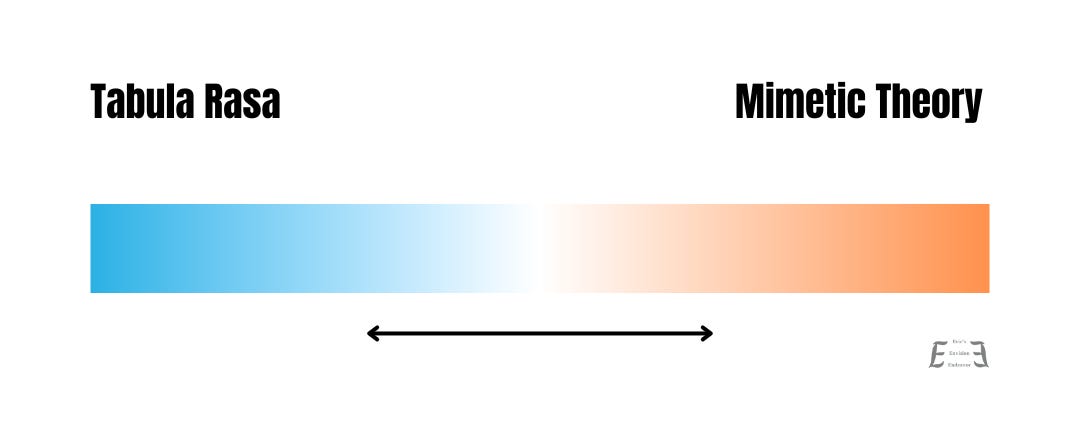What Makes You, You?
Ultimately, when we go to bed at night all we have is us and our own thoughts—Our own reflection
“Connecting to what makes you different from everyone else is your life’s task.”
— Robert Greene
Worth Listening To
Robert Greene has spent his career cultivating a fascinating perspective on life. He has written extensively about finding our life’s task, the meaning of power, and how to master skills. Each of these conversations covers different topics, and both are exceptional. Robert’s retelling of his experience suffering a stroke (Huberman Lab episode) and nearly dying in 2018 was especially remarkable.
Links:
Heroes and Failure
“For I had already learned that self-consciousness is the enemy of all creativity.” — Ray Bradbury
“What do I uniquely have to offer the world? What do I do different from everyone else?” These questions routinely drift across my mind. While the underlying theme is powerful, the world is so saturated with information that these questions become crippling. Instead of drifting from one end of my mind to the other, they remain rooted to the spot, like a ship stranded at sea.
Many of you have been reading my work since I first began ten months ago. You’ve likely noticed my absence in your inbox these past three months. “Self-consciousness is the enemy of all creativity.” I’ve repeated that statement to myself over and over, often to no avail. I reckon it’s much like the individual who wants to become healthy. They read similarly powerful quotes about health, expecting it to change their behavior. But ultimately we are responsible for changing and improving our own behavior.
So here I sit, writing to you once more. Hopefully, if you are struggling to remain consistent with your health journey, it will provide you with a spark to light your fire.
A Small Ask
I am currently in the process of rebuilding Envision Fitness’s website. The owner of the company building my site told me I needed to get more reviews and success stories.
If you work or have worked with me at Envision Fitness (even in a virtual-only capacity), I would greatly appreciate a Google Review (Link) and/or a success story about your time working with me. You can send your success stories to me at eweiner@envisionfitnessmn.com.
Thank you!
Have you ever failed to reach a goal? Did you accept that you failed to reach whatever that goal may have been? Or, did you make excuses for why you didn’t attain it? Most importantly, did you learn something about yourself in that moment?
Each of us may have similar goals. As you may imagine, I hear a lot of people tell me they want to lose weight or tone their body. This is great but superficial and not very helpful in understanding our true motivations—what lies under the surface. The real goals sit there. Most of the time, our goals stem from a place of insecurity or vulnerability. I was a particularly scrawny kid with no exceptional athletic skills. This insecurity is part of the reason I became a personal trainer. Go figure.
But the reality is that, that scrawny, unathletic kid still bothers me. I used to punish myself for it, spending hours upon hours at the gym lifting as heavy of weights as I possibly could until I hurt myself. At the time, I didn’t know where this obsession came from. I just wanted to lift heavy things and “be bigger”. It took a lot of time to journey inward. Interestingly, much of that process came from external sources: listening to many of you explain your goals revealed much about myself as well.
As a society, we are unbelievably dismal at understanding ourselves. Our time spent reflecting on our emotions, on our choices, and on the stepping stones we’ve collected has been replaced with staring at our screens. But the answers we seek always lie under the surface.
In my previous post, I mentioned the ancient Greek concept of a Tabula Rasa—that we are born as a blank slate, with no preconceived notions or opinions of the world. Robert Greene says that as we enter the social realm, we begin losing our true identity. Rene Girard’s mimetic theory, that what we want is not what we really want but rather a desire to mimic others, exemplifies the extreme example of identity lost. Social pressures compel us to conform to certain behaviors and desires.
To a large extent, conformity is necessary and evolutionary. Walking naked down Main Street shouting, “I’m being true to myself!” probably isn’t the best idea if you’re objective is to remain part of the tribe.
But there is always a balancing act:
Last year, I wrote about embracing imperfection as a means of getting things done and to avoid overthinking and stagnation. This was something I needed to reread to help me start writing again. I want to take this concept one step further and suggest that perhaps we should even set out to embrace the possibility of failure.
Think about heroes. What do heroes do? They fail. A lot.
“The quest stands upon the edge of a knife. Stray but a little, and it will fail, to the ruin of all.” Fortunately, we’re not embarking on a quest to destroy the evil dark lord, Sauron, and save the world. But there is value in embracing our own hero’s journey. In fact, people who embrace their own life as a hero’s journey find more meaning and significance in their lives.
Many kids aspiring to be great athletes consider Roger Federer among their heroes. In his speech to Dartmouth’s graduating class, he had this to say about failure:
“In the 1,526 singles matches I played in my career, I won almost 80% of those matches. Now, I have a question for you: What percentage of points do you think I won in those matches? Only 54%. In other words, even top-ranked tennis players win barely more than half of the points they play. When you lose every second point, on average, you learn not to dwell on every shot. You teach yourself to say it’s only a point… When you’re playing a point, it has to be the most important point in the world. But when it’s behind you, it’s behind you.”
If you invest in the stock market, it’s a very similar story. Between 1951 and 2023, the S&P 500 finished up 53.6% of the days and down 46.4% of the days. But, similarly, the S&P finishes up for an entire year 80% of the time.
Therein lies the solution. If failures comes roughly every second turn, knowing that it will come significantly lessens the impact of the blow. Not every workout has to be a perfect workout; not every meal needs to be perfectly balanced; not every day has to be perfect. We chip away, little by little, and eventually we’ll look back and realize how far we’ve climbed.
When we want to quit, we have our direction to guide us—a purpose. We understand what lies under our surface. Frodo’s journey in the Lord of the Rings is relatively straightforward; it was chosen for him. Our path’s are much trickier in that we must both set our own direction and implement our own sense of urgency. But in the wise words of Gandalf the Grey, “All we have to decide is what to do with the time that is given to us.”
I could have given up on this newsletter entirely. Each day I don’t write, each week I have not written to you is a day and a week of failure. But just maybe I can hit that 54 and 80 percent.
Other Learning
Articles:
Fela Kuti in Prison — Ted Gioia
To Lead a Meaningful Life, Become Your Own Hero — Scientific American
Exploring Happiness, Sex Changing, Hero’s Journey — Rob Henderson
Luxury Beliefs are Status Symbols — Rob Henderson
Minneapolis' Natural Upzoning Experiment - Zak Yudhishthu
Skilled Immigration is a National Security Priority — Noah Smith
America’s Supply Chains are a Disaster Waiting to Happen — Noah Smith (Guest post)
How to Read Plato — Ted Gioia
"Accelerating Wisdom" Episode 2: Revealing Attractors — The Leading Edge by Tom Morgan
The Cult of Blind Ambition — Hot Takes by Adam Singer
Podcasts:
Other:



